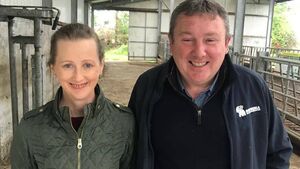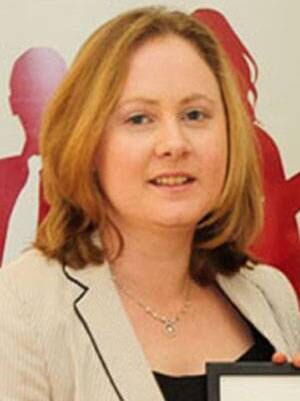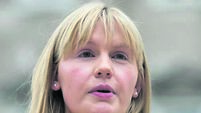County Roscommon farmers to host Teagasc National Future Beef walk

Grainne and Shane Keaveney, from Ballinlough, are participants in the Teagasc Future Beef programme.
A Teagasc National Future Beef farm walk will be held on a County Roscommon farm on Wednesday, September 11th at 6 p.m.. (F45 W599)
Shane and Gráinne Keaveney from Ballinlough, along with their three children, operate a suckling to finishing system with bulls finished under 16 months and heifers that are not kept as replacements sold as stores. This was not always the case, as Shane previously operated a suckling to weanling system. “Over the past number of years I have increased my cow numbers from 5 to 37 cows calving last spring,” said Shane. He joined the Future Beef programme back in 2021 and has made many changes to his system since.
He farms 35Ha split into four main blocks. Eight Ha are rented with just 4.93Ha around the farmyard. The largest block is 18.13Ha where silage is taken and the cows, calves and bull are grazed over the grazing season.
Most of the soil on the farm is heavy in nature. There is a mixture of clay and peat soil. All the slurry on the farm is spread with a low emission system. The cows run with a bull and this changed to a Charolais bull three years ago. The cow type is mainly LM/SA crosses.

The outer block is simply divided into two acre paddocks. Shane is measuring grass and is set up on PastureBase. He is a member of the local beef grass group and this has helped him a lot with making decisions on paddocks, fertiliser, reseeding etc.
Future Beef advisor Gabriel Trayers said: “I have been working with Shane for the last number of years. He has made huge improvements in the breeding performance on the farm and is hitting all the key performance indicators. Shane has targeted to reduce the age of slaughter by pushing the bull weanlings earlier and by feeding a high quality red clover silage over the winter. In addition, he has adopted simple actions to reduce harmful emissions by switching to protected urea, applying slurry using LESS and reducing the chemical fertiliser overall.”
The Keaveneys are also involved with Social Farming Ireland. Social farming provides people who use services with the opportunity for inclusion, to increase self-esteem and to improve health and well-being by taking part in day to day farm activities on the farm.
Producing heavy, quality weanlings is a key part to the Keaveney’s farming system. This will be discussed in detail at the walk along with the farms physical and financial performance.
In 2023 the Keaveneys started growing red clover silage. Initially 4.5 acres was sown and that has now grown to six acres. The 2023 crop was cut twice and the new field (1.5 acres) was cut once so far in 2024 yielding a total of 60 bales. The total six acres will be harvested again in the coming days weather permitting.
The establishment and management of red clover will be discussed at the walk and how Shane has used it to increase weanling weight gains over the winter period.
The farm is located in the Island River catchment, which is also within a Priority Area for Action (PAA) and eligible for European Innovation Partnership (EIP) funding.
On Wednesday Kieran Kenny Teagasc ASSAP advisor will highlight the water quality measures implemented on this farm.
John Kelly from Waters of Life project will also outline the significant plan for the catchment in supporting additional measures and the opportunities for local farmers.
The Agricultural Sustainability Support and Advisory Programme or ASSAP is a free and confidential advisory service for farmers. The aim of the programme is to support farmers to implement actions that help improve water quality in their local catchment. It is targeted in PAA’s where there is a risk to the waterbody status. The programme is made up of scientists that assess the streams and advisors who work closely with farmers.
The work that farmers undertake is funded by ‘The Farming for Water EIP’. This EIP has secured €50 million in funding to some 15,000 farmers up to the end of 2027. The payments finance a range of measures on farms to help improve water quality by reducing the losses of nutrients, sediment and pesticides. There are over 40 measures to choose from which typically include stream fencing, alternative water supply, nose pumps, solar pumps, riparian buffer zones, hedge and tree planting, earthen bunds etc. Farmers are contacted by their ASSAP advisor and a visit arranged to identify the issues on their farm. Following a discussion on possible mitigation actions, the farm plan is agreed and an application is submitted for funding the appropriate measures.
The Beef Market Outlook will be disused by Brendan Egan, Castlerea Livestock Mart Manager and Anthony O'Dowd from Dawn Meats. There will be a number of industry stakeholder available to meet and discuss any queries you may have and refreshments will be served.
Local Teagasc advisor Charlie Devaney said: “It has been a very difficult year on farmers across the country. Managing grass and breeding on farms has been very challenging. The focus of the event will be 'Opportunities in Suckler Farming' by increasing sustainability through improving breeding, soil fertility, water quality and incorporating red clover. This walk will offer an opportunity for farmers to see how Shane is implementing these on this farm.”Further information available at www.teagasc.ie





